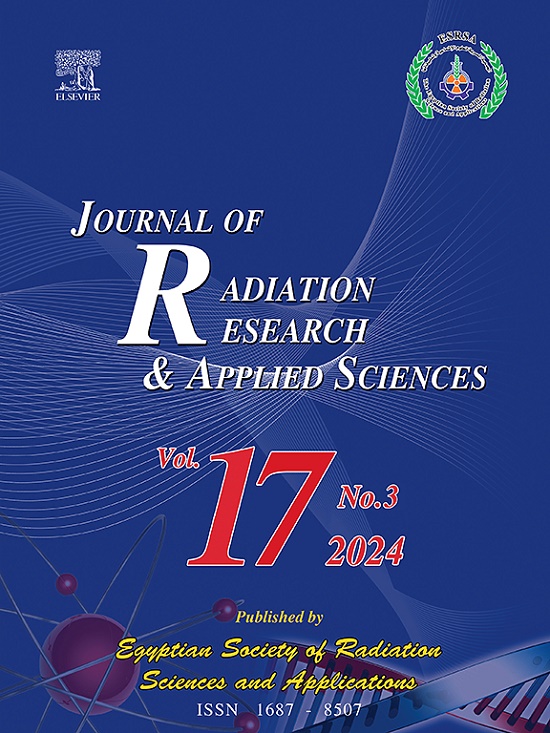磁化水减轻大鼠alcl3诱导的氧化应激和阿尔茨海默氏样神经毒性
IF 1.7
4区 综合性期刊
Q2 MULTIDISCIPLINARY SCIENCES
Journal of Radiation Research and Applied Sciences
Pub Date : 2025-05-30
DOI:10.1016/j.jrras.2025.101660
引用次数: 0
摘要
目的探讨磁化水对氯化铝(AlCl3)诱导的脑氧化损伤和阿尔茨海默病样神经毒性的保护作用。方法将大鼠分为四组,第一组为自然水对照组,第二组为磁化水对照组,第三组为AlCl3组,第四组为AlCl3 +磁化水组。结果AlCl3可引起大鼠脑神经退行性变,证据如下:1)脑及血清高铝浓度,2)氧化应激损伤[过氧化氢酶(CAT)和超氧化物歧化酶(SOD)活性低,丙二醛(MDA)水平高],3)脑乙酰胆碱(ACh)水平降低,4)脑乙酰胆碱酯酶(AChE)活性升高,5)脑HDAC3和APP基因上调,6)脑IGF1、GH、PSEN2和APOE4基因下调,7)明显的组织病理学改变,包括颗粒状神经元细胞和锥体细胞固缩、胶质结节、淀粉样斑块样结构、颗粒细胞萎缩、空泡化神经丸和浦肯野神经元变性。8)星形胶质细胞细胞质和突起中GFAP阳性表达。另一方面,与单独接受AlCl3治疗的大鼠相比,接受AlCl3加磁化水治疗的大鼠的这些改变有所改善。结论磁化水对alcl3诱导的脑氧化损伤和神经毒性具有保护作用。这些临床前研究结果突出了磁化水作为进一步研究的候选者,包括剂量反应研究和人体试验,以评估与年龄相关的认知障碍的疗效。本文章由计算机程序翻译,如有差异,请以英文原文为准。
Magnetized water mitigates AlCl3-induced oxidative stress and Alzheimer's-like neurotoxicity in rats
Objectives
This study aimed to investigate the possible neuroprotective effects of the magnetized water on aluminum chloride (AlCl3)-induced oxidative damage and Alzheimer's-like neurotoxicity in the brain.
Methods
There were four groups of rats: the 1st group (the control with natural water), the 2nd group administered with magnetized water, the third group treated with AlCl3, and the fourth group received AlCl3 plus magnetized water.
Results
Administration of AlCl3 triggered neurodegeneration in the brain as evidenced by: 1) high Al concentration in brain and serum, 2) oxidative stress damage [low activities of catalase (CAT) and superoxide dismutase (SOD), high levels of malondialdehyde (MDA)], 3) reduction of the acetylcholine (ACh) level in the brain, 4) increase of acetylcholinesterase (AChE) activities in the brain, 5) upregulation of brain HDAC3 and APP genes, 6) downregulation of brain IGF1, GH, PSEN2 and APOE4 genes, 7) noticeable histopathological alterations including pyknosis of granular neuron cells and pyramidal cells, glial nodules, amyloid plaque-like structure, shrunken granular cells, vacuolated neuropils, and degenerated Purkinje neurons, and 8) positive GFAP expression in the cytoplasm and processes of astrocytes. On the other hand, these alterations were ameliorated in rats that received AlCl3 plus magnetized water compared to the rats treated with AlCl3 alone.
Conclusion
We conclude a neuroprotective potential of the magnetized water against AlCl3-induced oxidative damage and neurotoxicity in the brain. These preclinical findings highlight magnetized water as a candidate for further investigation, including dose-response studies and human trials to assess efficacy in age-related cognitive disorders.
求助全文
通过发布文献求助,成功后即可免费获取论文全文。
去求助
来源期刊

Journal of Radiation Research and Applied Sciences
MULTIDISCIPLINARY SCIENCES-
自引率
5.90%
发文量
130
审稿时长
16 weeks
期刊介绍:
Journal of Radiation Research and Applied Sciences provides a high quality medium for the publication of substantial, original and scientific and technological papers on the development and applications of nuclear, radiation and isotopes in biology, medicine, drugs, biochemistry, microbiology, agriculture, entomology, food technology, chemistry, physics, solid states, engineering, environmental and applied sciences.
 求助内容:
求助内容: 应助结果提醒方式:
应助结果提醒方式:


